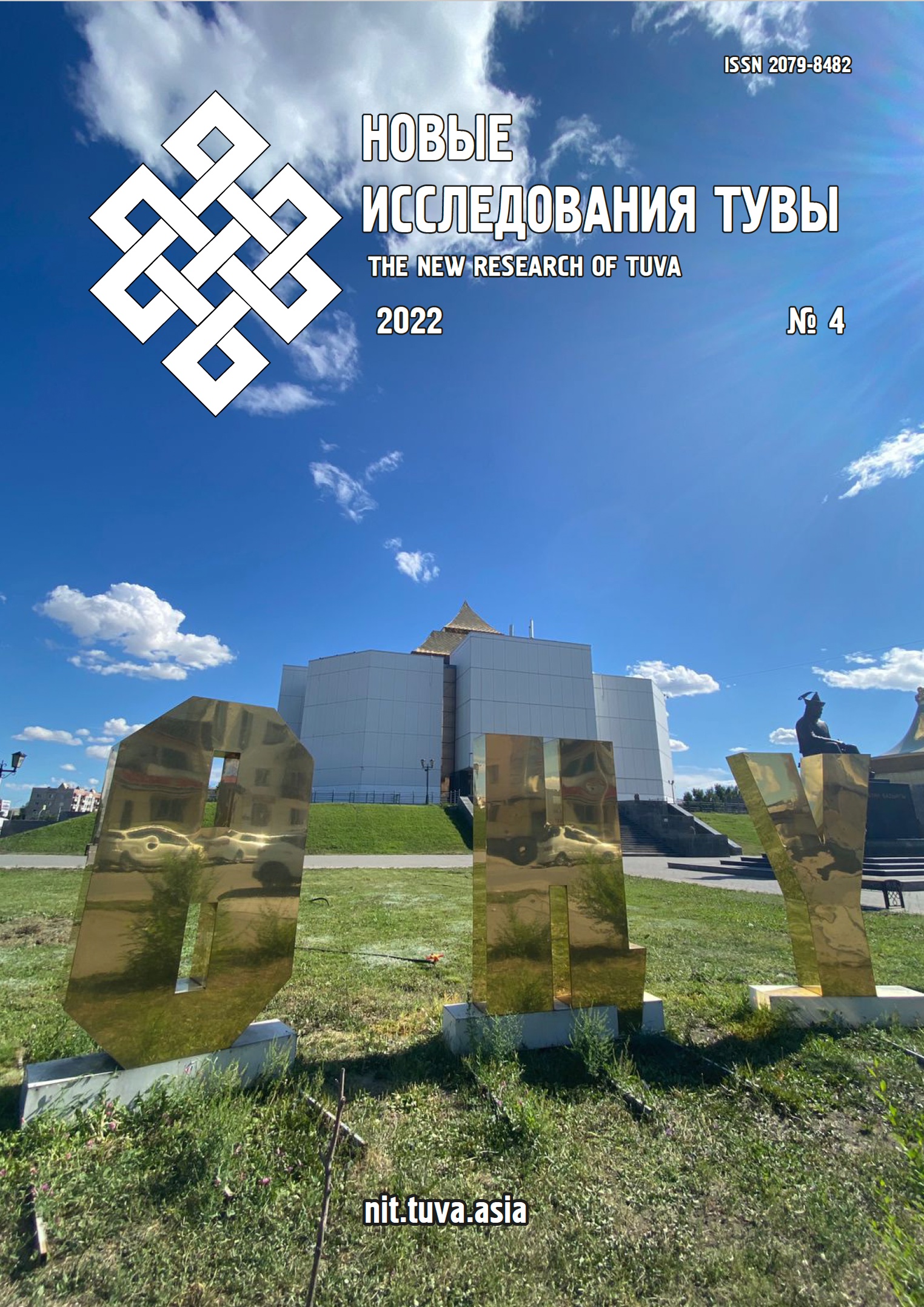The essence and peculiarity of the linguistic identity of the Sakha youth in contemporary sociocultural context
DOI:
https://doi.org/10.25178/nit.2022.4.7Keywords:
Yakut language; Sakha; Sakha youth; Republic of Sakha; native language; linguistic self-identification; linguistic competence; language mindset; language policyAbstract
The article discusses the nature of the linguistic identity of contemporary Sakha youth living in Yakutsk, the Republic of Sakha (Yakutia), including the aspect of its dynamics. It is based on the research data obtained during ethnic, social, psychological and linguistic monitoring that was conducted in 2007, 2014 and 2021.
The consistency of the ethnolinguistic identity of the Sakha youth under the acute influence of external factors (an objective decrease in language competence, deterioration of active skills and improvement of passive ones) has been determined. The communicative strategy is characterized by the substitution of linguistic competence with sociolinguistic competence and accommodation. A significant sociolinguistic characteristic of the youth is the availability of ethnolinguistic resources for the reproduction of their native language. They are in a very inert state due to the transformation of the oncoming generation’s values, the degradation of the conditions of bilingualism under the influence of linguistic and political as well as socioeconomic factors, the negative impact of mass digitalization.
References
Arefiev, A. L., Bakhtikireeva, U. M. and Sinyachkin, V. P. (2021) Problemy bilingvizma v sisteme shkol'nogo iazykovogo obrazovaniia Respubliki Tyva [Bilingualism in language education in secondary schools of the Republic of Tuva]. New Research of Tuva, no. 1, pp. 255–272. (In Russ.). DOI: https://doi.org/10.25178/nit.2021.1.14
Arutiunova, E. M. (2019) Iazykovaia situatsiia v Respublike Sakha (Iakutiia) v kontekste iazykovykh protivorechii v shkol'nom obrazovanii [Language situation in the Republic of Sakha (Yakutia) in the context of language contradictions in school education]. Information and analytical bulletin (INAB), no. 1, pp. 50–61. (In Russ.). DOI: https://doi.org/10.19181/inab.2019.1.4
Belousov, V. N., Grigorian, E. A., Pozdniakova, T. Yu. (2001) Russkii iazyk v mezhnatsional'nom obshchenii. Problemy issledovaniia i funktsionirovaniia [The Russian language in international communication. Issues of research and functioning]. Moscow, Vinogradov Russian Language Institute of the RAS. 240 p. (In Russ.).
Boiko, S. A. (2014) Anglitsizmy v sovremennom russkom iazyke: lingvoekologicheskii aspekt [Anglicisms in modern Russian: Linguoecological aspect]. Ekologiia iazyka i kommunikativnaia praktika, no. 2 (3), pp. 32–43. (In Russ.).
Bondarenko, O. R. (2020) Sovremennaia dilemma: ovladenie angliiskim iazykom i sokhranenie russkoiazychnoi identichnosti? [Modern dilemma: To master English and to maintain Russian-speaking cultural identity?]. Proceedings of Voronezh State University. Series: Linguistics and Intercultural Communication, no. 3, pp. 6–14. (In Russ.). DOI: https://doi.org/10.17308/lic.2020.3/2925
Vereshchagin, E. M. (2014) Psikhologicheskaia i metodicheskaia kharakteristika dvuiazychiia (bilingvizma) [Psychological and methodological characteristics of bilinguality (bilingualism)]. Moscow ; Berlin, Direct-Media. 162 p. (In Russ.).
Gabdrakhmanova, G. F. (2022) Molodezhnaia politika v Respublike Tatarstan v doktrinal'nykh dokumentakh i obshchestvennom mnenii [Youth policy in the Republic of Tatarstan in doctrinal documents and public opinion]. Sotsiologicheskie issledovaniia, no. 2, pp. 73–82. (In Russ.). DOI: https://doi.org/10.31857/S013216250014947-4
Grenoble, L. (2021) Sotsiolingvistika i iazykovoi sdvig: k ponimaniiu protsessov sdviga cherez prizmu nositelei [Sociolinguistics and language shift: Toward understanding the processes of shift through the prism of speakers]. Sociolinguistics, no. 2 (6), pp. 9–35. (In Russ.). DOI: https://doi.org/10.37892/2713-2951-2021-2-6-9-35
Griaznova, E. V. and Afanas'ev, S. V. (2017) Individualizatsiia cheloveka v informatsionnoi sotsializatsii [Individualization of a person in the information socialization]. Filosofskaia mysl', no. 1, pp. 17–29. (In Russ.). DOI: https://doi.org/10.7256/2409-8728.2017.1.20968
Guboglo, M. N. (2003) Identifikatsiia identichnosti: etnosotsiologicheskie ocherki [Identification of identity: Ethnosociological essays]. Moscow, Nauka. 764 p. (In Russ.).
Zhegusov, Yu. I. and Koriakina, Z. I. (2022) Sotsial'nye faktory snizheniia prestupnosti molodezhi v Respublike Sakha (Iakutiia) [Social factors of youth crime decline in the Republic of Sakha (Yakutia)]. Sotsiologicheskie issledovaniia, no. 4, pp. 93–104. (In Russ.). DOI: https://doi.org/10.31857/S013216250018701-4
Zakharkina, T. N. and Isakova, I. A. (2019) Gadzhetizatsiia: effekty vliianiia na obshchestvennye protsessy [Gadgetization: Effects of influence on public processes]. Vestnik Nizhegorodskogo universiteta im. N. I. Lobachevskogo. Seriia:Sotsial'nye nauki, no. 3 (55), pp. 115–121. (In Russ.).
Ivanova, N. I. (2013) Etnoiazykovaia situatsiia v g. Iakutske [Ethnolanguage situation in Yakutsk]. In: Sovremennaia etnoiazykovaia situatsiia v Respublike Sakha (Iakutiia) [Contemporary ethnolinguistic situation in the Republic of Sakha (Yakutia)] / ed. by P. A. Sleptsov. Novosibirsk, Nauka. 252 p. Pp. 75–112. (In Russ.).
Ivanova, N. I. (2015) Sovremennyi nositel' iakutskogo iazyka g. Iakutska: sotsiolingvisticheskaia kharakteristika v dinamike. 2008 i 2014 gg. [A modern native speaker of the Yakut language living in Yakutsk: Sociolinguistic characteristics in dynamics. 2008 and 2014]. North-Eastern Journal of the Humanities, no. 2 (11), pp. 64–69. (In Russ.).
Ivanova, N. I. (2016) «Mesta pamiati» v sotsiolingvisticheskoi interpretatsii (k postanovke problemy) [“Places of memory” in sociolinguistic interpretation (to the formulation of the problem)]. North-Eastern Journal of the Humanities, no. 4 (17), pp. 65–68. (In Russ.).
Ivanova, N. I. (2017) Sotsiolingvisticheskie aspekty funktsionirovaniia iakutskogo iazyka v g. Iakutske: tsifry i fakty [Sociolinguistic aspects of the functioning of the Yakut language in Yakutsk: Facts and figures]. Moscow, Iazyki narodov mira ; Institute for Humanities Research and Indigenous Studies of the North of the SB RAS. 260 p. (In Russ.).
Ivanova, N. I. (2020a) Sovremennye tendentsii v iazykovoi kompetentsii sakha: lingvisticheskii i ekstralingvisticheskii kontekst [Modern trends in the Sakha language competence: Linguistic and extralinguistic context]. In: Etnosotsial'nye protsessy v Iakutii: sovremennyi rakurs i perspektivy razvitiia [Ethnosocial processes in Yakutia: Modern perspective and development prospects] / ed. by V. B. Ignatiev. Yakutsk, Institute for Humanities Research and Indigenous Studies of the North of the SB RAS. 312 p. Pp. 228–248. (In Russ.).
Ivanova, N. I. (2020b) Tendentsii i dinamika razvitiia dvuiazychiia v Respublike Sakha (Iakutiia): etnosotsiopsikholingvisticheskii aspekt [Trends and dynamics of bilingualism in the Republic of Sakha (Yakutia): Ethnosocial psycholinguistic aspect]. North-Eastern Journal of the Humanities, no. 2 (31), pp. 67–79. (In Russ.). DOI: https://doi.org/10.25693/SVGV.2020.31.2.008
Ivanova, N. I. (2021) Osobennosti etnoiazykovoi identichnosti sakha v usloviiakh massovykh urbanizatsionnykh protsessov [Features of the ethnolinguistic identity of the Sakha in the conditions of mass urbanization processes]. In: XIV Kongress antropologov i etnologov Rossii [The 14th Congress of Anthropologists and Ethnologists of Russia] : A collection of materials. Tomsk, July 6–9, 2021 / ed. by I. V. Nam. Moscow, Tomsk, Tomsk State University Publishing House. 830 p. Pp. 37–38. (In Russ.).
Ivanova, N. I., Nikitina, V. N., Filippova, A. G. (2021) Sotsiolingvisticheskaia obuslovlennost' funktsionirovaniia iakutskogo iazyka v sfere shkol'nogo obrazovaniia: istoki nachinaiushchegosia krizisa [Sociolinguistic conditionality of Yakut language functioning in field of school education: Origins of incipient crisis]. Nauchnyi dialog, no. 10, pp. 65–84. (In Russ.). DOI: https://doi.org/10.24224/2227-1295-2021-10-65-84
Intymakova, L. G. (2013) Individual'noe soznanie: mifologizatsiia i sekuliarizatsiia [Individual consciousness: Mythologization and secularization]. Vestnik Taganrogskogo gosudarstvennogo pedagogicheskogo instituta, no. 2, pp. 148–153. (In Russ.).
Kudriavtseva, R. A. and Shabykov, V. I. (2019) Budushchee mariiskogo iazyka v vospriiatii sovremennoi molodezhi [Future of the Mari language in the eyes of modern youth]. In: Iazyki v polietnicheskom gosudarstve: razvitie, planirovanie, prognozirovanie [Languages in a polyethnic state: Development, planning and prospects] : Proceedings of the International Conference (Republic of Buryatia, Ulan-Ude–Goryachinsk, July 1–4, 2019) / ed. by G. A. Dyrkheeva et al. Ulan-Ude, Publishing House of the Buryat Scientific Centre of the SB RAS. 262 p. Pp. 174–178. (In Russ.). DOI: https://doi.org/10.31554/978-5-7925-0559-9-2019-174-178
Madiukova, E. A., Persidskaia, O. A. and Popkov, Yu. V. (2017) Obshchenatsional'naia i etnicheskaia identichnost' molodezhi etnicheskikh grupp respublik Sibiri v sravnitel'noi perspektive [Nationwide and ethnic identity of young people of ethnic groups living in Siberian republics in a comparative perspective]. Znanie. Ponimanie. Umenie, no. 3, pp. 69–83. (In Russ.). DOI: https://doi.org/10.17805/zpu.2017.3.6
Nizamova, L. V. (2012) Modernaia etnichnost' i ee modusy: teoriia i praktiki [Modern ethnicity and its modes: Theory and practice]. Uchenye zapiski Kazanskogo universiteta. Seriia: Gumanitarnye nauki, vol. 154, no. 6, pp. 105–116. (In Russ.).
Farakhutdinov, Sh. F. (2022) Regional'naia i etnicheskaia identichnost' studencheskoi molodezhi [Regional and ethnic identity of student youth]. Alma mater, no. 2, pp. 86–93. (In Russ.). DOI: https://doi.org/10.20339/AM.02-22.086
Shaposhnikova, I. V. (2018) K voprosu o iazykovoi politike v nauchno-obrazovatel'noi sfere [Issues of language policy in science and education]. Voprosy psikholingvistiki, no. 1 (35), pp. 173–191. (In Russ.). DOI: https://doi.org/10.30982/2077-5911-2018-35-1-173-191
Shirokanova, A. A. (2009) Individualizatsiia postsovetskoi molodezhi v sfere morali [Individualization of post-Soviet youth in the field of morality]. Sotsiologicheskie issledovaniia, no. 12 (308), pp. 121–126. (In Russ.).
Shcherba, L. V. (1974) Iazykovaia sistema i rechevaia deiatel'nost' [The language system and speech activity] : A collection of works. Leningrad, Nauka, Leningradskoe otdelenie. 427 p. (In Russ.).
Yadova, M. A. (2022) Zhiznennye traektorii molodezhi v XXI veke: riski i vozmozhnosti [Life trajectories of the youth in the 21st century: Risks and opportunities]. Sotsiologicheskie issledovaniia, no. 2, pp. 83–93. (In Russ.). DOI: https://doi.org/10.31857/S013216250011067-6
Published
How to Cite
For citation:
Ivanova N. I. Sushchnost’ i svoeobrazie iazykovoi identichnosti molodezhi sakha v sovremennom sotsiokul’turnom kontekste [The essence and peculiarity of the linguistic identity of the Sakha youth in contemporary sociocultural context]. New Research of Tuva, 2022, no. 4, pp. 89-105 (In Russ.). DOI: https://doi.org/10.25178/nit.2022.4.7
Issue
Section

This work is licensed under a Creative Commons Attribution-NonCommercial 4.0 International License.

Author(s) license holder(s) grant rights for their work to the journal (grantee of a license) under the simple non-exclusive open license in accordance with Art. 1286.1 «Open license for a research work, work of literature or fine arts», Civil Code of the Russian Federation.
New Research of Tuva publishes articles under the Creative Commons Attribution-NonCommercial license (CC BY-NC).
Since it is an open license, author(s) reserve the right to upload the article to their institutional repository, submit it to another journal (if it allows republications), or republish it on their own website (in full, or in part).
However, several conditions apply here:
a) The republished version must always contain the name(s) and affiliation(s) of the author(s), the original title and the hyperlink to the original version on the New Research of Tuva website;
b) It must be in open access, free of charge, and no category of readers must be in any way whatsoever advantaged over general readership.
c) should the contribution be submitted elsewhere by its author(s) without substantial modification (30% or more of original text unchanged), the body of the article should contain a disclaimer that the original version was published in New Research of Tuva (with a link to the respective page)
The CC-BY-NC is a non-revocable license which applies worldwide and lasts for the duration of the work’s copyright.









